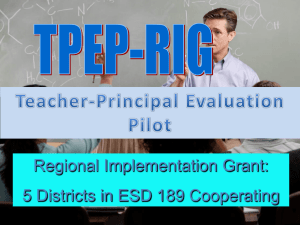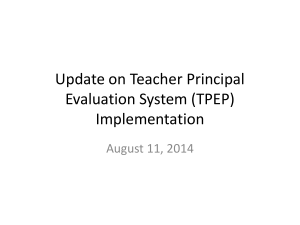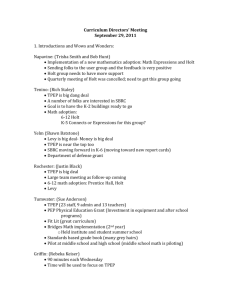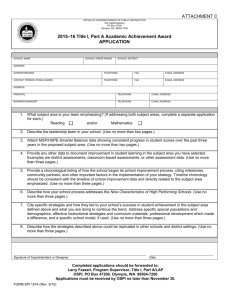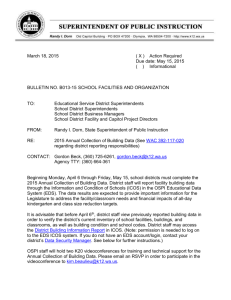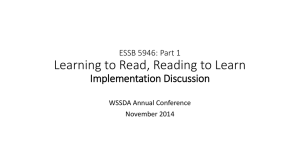B038-15 Addendum - Office of Superintendent of Public Instruction
advertisement
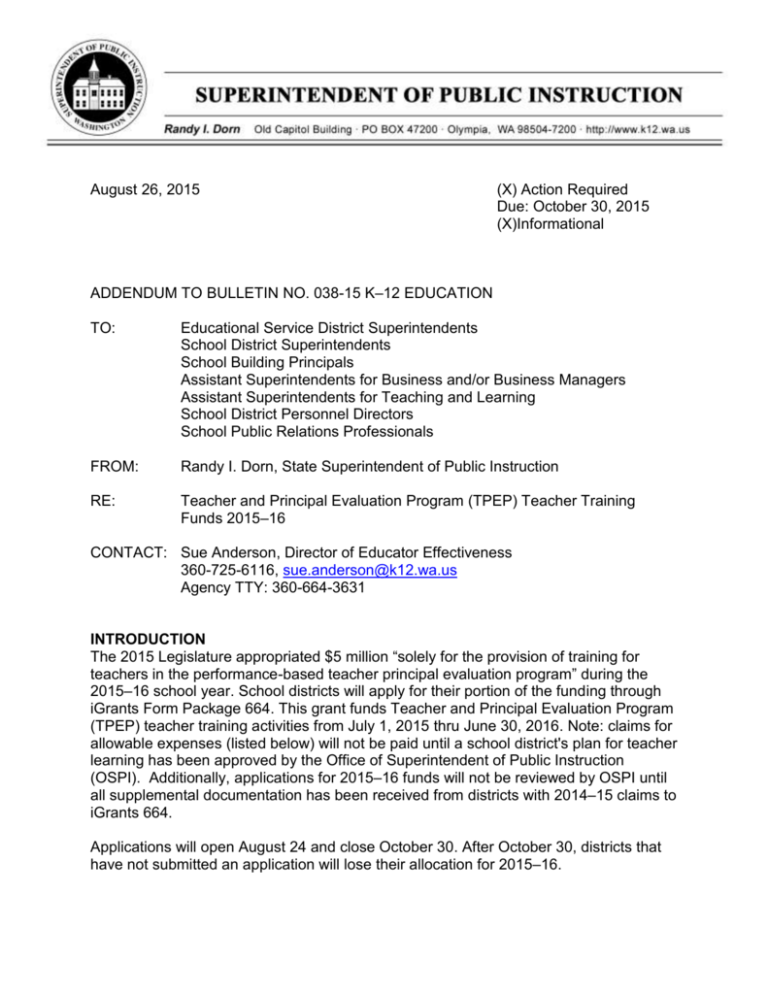
August 26, 2015 (X) Action Required Due: October 30, 2015 (X)Informational ADDENDUM TO BULLETIN NO. 038-15 K–12 EDUCATION TO: Educational Service District Superintendents School District Superintendents School Building Principals Assistant Superintendents for Business and/or Business Managers Assistant Superintendents for Teaching and Learning School District Personnel Directors School Public Relations Professionals FROM: Randy I. Dorn, State Superintendent of Public Instruction RE: Teacher and Principal Evaluation Program (TPEP) Teacher Training Funds 2015–16 CONTACT: Sue Anderson, Director of Educator Effectiveness 360-725-6116, sue.anderson@k12.wa.us Agency TTY: 360-664-3631 INTRODUCTION The 2015 Legislature appropriated $5 million “solely for the provision of training for teachers in the performance-based teacher principal evaluation program” during the 2015–16 school year. School districts will apply for their portion of the funding through iGrants Form Package 664. This grant funds Teacher and Principal Evaluation Program (TPEP) teacher training activities from July 1, 2015 thru June 30, 2016. Note: claims for allowable expenses (listed below) will not be paid until a school district's plan for teacher learning has been approved by the Office of Superintendent of Public Instruction (OSPI). Additionally, applications for 2015–16 funds will not be reviewed by OSPI until all supplemental documentation has been received from districts with 2014–15 claims to iGrants 664. Applications will open August 24 and close October 30. After October 30, districts that have not submitted an application will lose their allocation for 2015–16. ADDENDUM TO BULLETIN NO. 038-15 K–12 ED Page 2 August 26, 2015 BACKGROUND The Steering Committee strongly recommends that all districts create a plan that assures all teachers who have transitioned to the revised system have the training they need to be effective participants in their own evaluation. Priorities for this grant are (1) teachers new to the district; (2) teachers being transitioned in 2015–16; ((and)) (3) teachers transitioned in 2014–15; and (4) teachers who will transition in 2016–17. Keep in mind teachers new to your district need: An introduction to the revised evaluation system and any local regulations or definitions that have been codified. A working knowledge of the district’s chosen instructional framework. An opportunity to see how the rubrics connect to their work in classrooms. An understanding about how the student growth components will be implemented in your district. For teachers who transitioned previously, 2015–16 training should deepen knowledge of the framework and enhance opportunities for application. A focus on evidence gathering, formative assessment, and student growth is encouraged. POSSIBLE SCENARIOS District hosts a series of voluntary sessions on evidence gathering or formative assessment. District offers after school or Saturday sessions aimed at specific topics such as “Introduction to Focused Evaluation” or “Student Measures in the Arts” and teachers submit that time on Time, Responsibility and Incentive (TRI) forms. Districts participating in Education Service District (ESD) work related to TPEP/Common Core State Standards (CCSS) coherence offers sessions for teachers based on information gleaned in regional work. Teachers meet to create common assessments, analyze data from those assessments, and create instructional plans that respond to student learning needs. Teachers learn skills to enhance questioning across the curriculum. Teachers work together to learn collaborative strategies for improving student learning. A group of teachers on Comprehensive evaluations meet monthly to discuss various aspects of the process, share successes, and address common challenges. ADDENDUM TO BULLETIN NO. 038-15 K–12 ED Page 3 August 26, 2015 District plans and facilitates release days for professional development, spaced throughout the year, connecting CCSS math practices and the instructional framework. District training focuses on a subset of teachers with particular needs, such as provisional teachers or those selecting a focus on, for example, Criterion 3. School chooses a focus on Criterion 7; teachers on Focused meet regularly to share successful strategies for connecting with families and community. Team of teachers attends ESD open-enrollment learning opportunities focused on learning the instructional framework, the revised evaluation process, measures of student growth, or connections to WA standards and assessments. School hosts a day in August to review the framework and select areas of school-wide focus based on school improvement plan. Teachers meet in study groups regularly through the year—by grade level or content area—to discuss student growth goal setting, performance measures, and plan for collaborative monitoring. School or district sponsors book study for a group of teachers collaborating to learn more about a specific topic for Focused evaluations. FUNDING The maximum allocation a district will receive is based on its percentage of the state’s total teachers employed in their district on October 1, 2014. The percentages will be calculated on the School Apportionment and Financial Services report, “School District Personnel Summary Profiles – 2014–15.” This report is Table 19: Certificated Teacher – Preliminary Duty Roots 31, 32, 33, 34 (http://www.k12.wa.us/safs/PUB/PER/1415/tbl19.pdf). To view your district’s maximum allocation, please visit http://tpep-wa.org/teachertraining-maximum-allocations/. Based on the number of teachers employed statewide for 2014–15, this equates to roughly $83 per teacher to be spent on TPEP teacher training in the coming year. Title II, TRI, early release and late arrival, Professional Learning Community (PLC) time, staff meetings, and the contractual time 30 minutes before and after student hours are additional resources that could be tapped to support this critical learning. Each district will need to make decisions about how to allocate resources in a way that maximizes impact. REIMBURSEMENT OF EXPENSES AND SUPPLEMENTAL DOCUMENTATION Districts will claim reimbursement for TPEP teacher training expenses via the iGrants claiming system, in accordance with OSPI’s current grants management process. In addition, all supplemental documentation for Supplies and Purchased Services (such as contracts with Framework Authors, Specialists, ESDs) will be emailed to 664claims@k12.wa.us. ADDENDUM TO BULLETIN NO. 038-15 K–12 ED Page 4 August 26, 2015 Documentation for expenses paid to district employees for salary, benefits, stipends, substitutes, or mileage should remain in district files for audit purposes, but will not be submitted to 664claims@k12.wa.us. More information on the claiming process can be found at http://tpep-wa.org/trainingpd/teacher-training-funding/ under the ‘CLAIMING PROCESS’ section. If there are questions, email TPEP@k12.wa.us. School district applications for 2015–16 funds will not be reviewed by OSPI until all supplemental documentation has been received from that district for 2014–15 claims to iGrants 664. Allowable expenses (July 1, 2015–June 30, 2016): Release time and travel expenses for teachers to attend ESD-sponsored teacher trainings related to the implementation of the district’s TPEP teacher training plan. Stipends or curriculum-rate pay for teachers to attend trainings related to the implementation of the district’s TPEP teacher training plan. Substitute teachers so that teachers can attend trainings related to the implementation of the district’s TPEP teacher training plan. Consulting contracts with the instructional framework authors, ESDs, or framework trainers listed as TPEP Training Providers on the TPEP website (http://tpep-wa.org/trainingpd/tpep-training-providers/). Copy and supply expenses to support local evaluation trainings for teachers. Publications from the instructional framework authors, (CEL 5D+, Danielson, Marzano) are approved. Publications that support a deeper exploration of framework components are contingent upon written approval by the OSPI TPEP Director. Written approval must be included with supplemental documents when submitted to 664claims@k12.wa.us. Excluded expenses: Purchase of equipment, technology support, electronic licenses, DVDs, videos, or software. Purchase of curriculum or assessment materials. Out of district registration fees or travel, except to attend OSPI or ESDsponsored regional events related to TPEP. Consulting contracts, except with the instructional framework authors, ESDs, or framework trainers listed on the TPEP website (http://tpepwa.org/trainingpd/tpep-training-providers/). Expenses before July 1, 2015 or after June 30, 2016. ADDENDUM TO BULLETIN NO. 038-15 K–12 ED Page 5 August 26, 2015 RESOURCES TO INTRODUCE INSTRUCTIONAL FRAMEWORK TO TEACHERS OSPI maintains a list of approved framework specialists on its website. District teacher leaders who have developed TPEP expertise and are facilitating TPEP training can be paid from this fund, even if they are not on the OSPI framework specialist list. Consultants from outside the district cannot be paid from this grant unless they work for the framework author, are on the OSPI approved framework specialist list, or serve as a content specialist for an ESD. The name of the consultant must be provided in the application. Find a TPEP training provider at http://tpep-wa.org/trainingpd/tpep-training-providers/. FREQUENTLY ASKED QUESTIONS For specific information about implementation of TPEP, see the FAQ at http://tpepwa.org/about-tpep/faqs/. For questions regarding teacher or principal evaluation policy matters, please contact Sue Anderson at 360-725-6116 or email sue.anderson@k12.wa.us. The OSPI TTY number is 360-664-3631. K–12 EDUCATION Gil Mendoza, Ed.D. Deputy Superintendent Sue Anderson, Director Educator Effectiveness RD:sa OSPI provides equal access to all programs and services without discrimination based on sex, race, creed, religion, color, national origin, age, honorably discharged veteran or military status, sexual orientation including gender expression or identity, the presence of any sensory, mental, or physical disability, or the use of a trained dog guide or service animal by a person with a disability. Questions and complaints of alleged discrimination should be directed to the Equity and Civil Rights Director at (360) 725-6162 or P.O. Box 47200 Olympia, WA 98504-7200.

